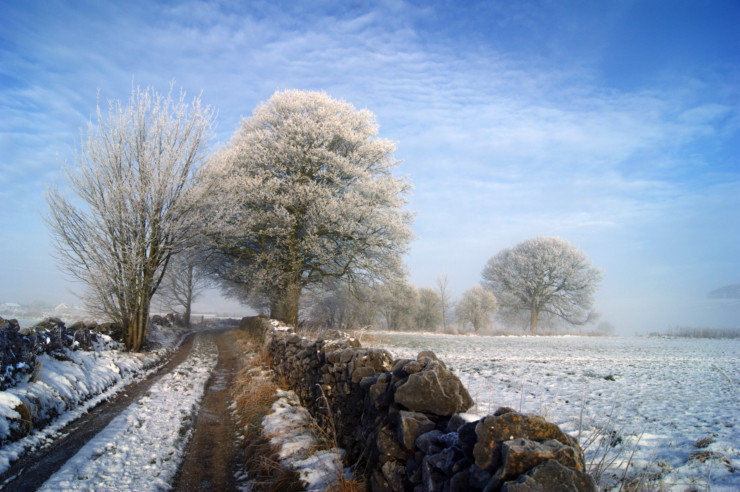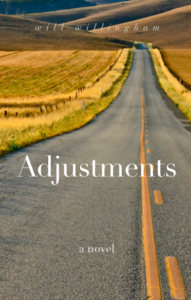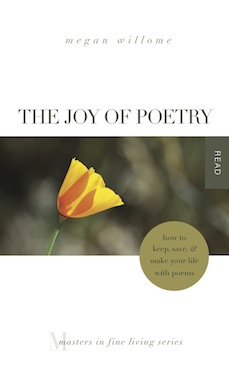The poet John Keats was not a funny fellow, although he did possess a dry wit. But Keats upside-down? That’s funny.
Will Phillips, an insurance adjustor, owns a frayed copy of Keats’ poetry that is bound upside-down. Joe Murphy — Will’s client and eventual friend — owns the same collection, but bound in the traditional fashion and in pristine condition.
[Will] closed the book and set it on his thigh, resting his hand on the cover. ‘It’s really beautiful next to mine.’
Joe picked up Will’s copy and thumbed the pages. ‘They’re the same. Open it. Look inside. Read something.’”
Adjustments opens with two epigraphs. One from the film Double Indemnity (Will’s hero is Barton Keyes), and one from Keats:
my mind has been the most discontented
and restless one that was ever
put into a body too small for it
In 1819 Keats wrote a letter to a friend, in despair about his poetic talent. Scholars now call that year the “Living Year,” the “Fertile Year,” or the “Great Year,” in which he wrote his best poems.
Will is having a great year. He just doesn’t know it yet.
When he’s summoned to an insurance claim at the home of Joe, he doesn’t know his life will be changed. Meeting Joe will bring Will from isolation into community. He’ll find a cast of small-town characters who like him for himself: Joe, of course; Pearl Jenkins, his know-it-all landlady; and Cameron, the girl not quite next door but across the street.
This change happens in a story marked by its humor. Adjustments is very funny, and it almost shouldn’t be. Insurance adjusters like Will are on the scene at fires and car accidents and at homes with roofs that go drip in the night. In the course of his job Will meets lonely people, hurting people. He encounters people who have died, and he finds the things they left behind — a woman’s black shoe, a Barbie doll head. He has to deal with an insensitive business partner, nicknamed Mad Dog, and with possibly The Most Frustrating Cadre of County Employees in the Dakotas. He does so with a good-natured chuckle, often at himself.
“Despite his idiosyncrasies and dysfunction, he’s having a life,” said Will Willingham, author of Adjustments. Some of the main character’s difficulties in adjusting are of his own making. Says the author, “Partly because Will has such a difficult time being firm about things he finds himself in the middle of this thing, and then he finds himself being happy about it: ‘Well, I guess we’ll go with it.’”
But the person he can’t just go with, the one that I as a reader am still not quite sure what to do with, is Barbara. Just as poetry resists easy interpretation — including Keats — so does Adjustments’ Barbara.
We first meet Barbara as the name Will gives to his GPS. But her bossing of him is not limited to giving driving directions. She nags at him to stop smoking. She has an outsized role in his memories.
“Barbara had to be this massive thorn in his side who is actually a real person,” Will Willingham said. “Barbara is still such a question mark to me. It’s the most bizarre relationship I’ve ever seen.”
When Keats went on his six-week walking tour, the one that led to the great poetry, he brought along one book: a translation of Dante. Will Phillips travels through his adjustments with two books: the upside-down Keats and Hans Christian Andersen’s The Wild Swans. The fairy tale serves as a metaphor for the secret that is Will. But Will thinks he’s the only one in the world with a secret.
Cameron tries to disabuse him of that notion:
[Will]:’Do you suppose Pearl has a secret? Or Joe?’
[Cameron]: ‘Oh, I’m quite sure they do. You need to stop covering your eyes with your wing so you can see them.’”
That’s what this story is about: being seen. It’s about the illusions we create and about learning to listen to the little man inside, the one insurance investigator Barton Keyes refers to as “the little man in here.”
The year after Keats’ six-week adventure was his Great and Living Year, when he wrote his masterpieces: Hyperion, To Autumn, Ode on a Grecian Urn, and Ode to a Nightingale. As Adjustments ends (after an adventure of about two weeks), we get the impression that Will Phillips’ Great and Living Year is just starting.
“There’s a sense of hope at the end,” Will Willingham said.
Character Will kicks off his great year by writing a poem:
She eats fear with morning coffee—
chunks of ash black in her mouth,
worries cinders
between delicate fingers
mixed with a trickle
from her cheek
to spread on burnt toast
Watch out, Keats.
October Pages
Finished
Poetry
The songs from Daisy Jones and The Six, Taylor Jenkins Reid (because even ’70s rock ‘n’ roll can be poetry)
Flame and Shadow, Sara Teasdale
Adult
Notes of a Native Son, James Baldwin (longish essay)
What’s a Dog For?, John Homans
Daisy Jones and The Six, Taylor Jenkins Reid (the audio version is a must)
Adjustments, Will Willingham
Early Readers and Picture Books
Mr. Mistoffelees with Mungojerrie and Rumpleteazer, T.S. Eliot, illus. Errol Le Cain (also poetry, obviously)
Fear the Bunny, Richard T. Morris, illus. Patricia Burris (with the complete text of William Blake’s The Tyger)
Dotty, Erica S. Perl, illus. Julia Denos (Join us next Friday, November 8, for Children’s Book Club!)
Middle Grade and YA
Goldilocks, Go Home!, Martha Freeman, illus. Marta Sevilla (early reader chapter book)
Emerald Illusion, J. Rodes
Made Progress
The Ghost Bride, Yangsze Choo
Your turn
1. What is the last book that made you laugh?
2. Did you make some time for deep reading this month? What stories stirred your soul?
3. Share your October pages. Sliced, started, and abandoned are all fair game.
Photo by Simon Harrod, Creative Commons, via Flickr. Post by Megan Willome.
Browse more Reader, Come Home
“Megan Willome’s The Joy of Poetry is not a long book, but it took me longer to read than I expected, because I kept stopping to savor poems and passages, to make note of books mentioned, and to compare Willome’s journey into poetry to my own. The book is many things. An unpretentious, funny, and poignant memoir. A defense of poetry, a response to literature that has touched her life, and a manual on how to write poetry. It’s also the story of a daughter who loses her mother to cancer. The author links these things into a narrative much like that of a novel. I loved this book. As soon as I finished, I began reading it again.”
—David Lee Garrison, author of Playing Bach in the D. C. Metro
- Perspective: The Two, The Only: Calvin and Hobbes - December 16, 2022
- Children’s Book Club: A Very Haunted Christmas - December 9, 2022
- By Heart: ‘The night is darkening round me’ by Emily Brontë - December 2, 2022



Glynn says
The last book that made me laugh – “Boom!” by Mark Haddon. It opens with a scene of a boy letting loose his sandwich from a balcony – aimed right at the head of his sister’s despised boyfriend. It’s done so well that I laughed out loud.
Books read in October (an odd combination of deep and light reading):
Historical Fiction
Cometh the Hour by Annie Whitehead
Poetry
Dream Work by Mary Oliver
The Unaccompanied by Simon Armitage
An Ever River by David Russell
Non-fiction
C.S. Lewis: A Very Short Introduction by James Como
The Global and American Spirit by Evan Lanning
Who is an Evangelical? by Thomas Kidd
Victoria & Albert: Our Lives in Watercolour by Carly Collins
Praying with Jane (Austen) by Rachel Dodge
Adorning the Dark by Andrew Peterson
Christmas Fiction
Christmas Crisis in Chancey by Kay Dew Shostak
Gift of the Magpie by Zoe McCarthy
Carousel Horse Christmas by Danni Roan
Christmas Love Year Round by Elaine Stock
The Cowboy’s Christmas Reunion by Valerie Comer
Calm and Bright by Autumn Macarthur
Snow Angels by Cathe Swanson
Winter’s Kiss by Sienna Carr
Mystery
The Farming Murder by Roy Lewis
Silent as the Dead by Scott Hunter
A Darkly Hidden Truth by Donna Fletcher Crow
Blood on the Cowley Road by Peter Tickler
Literary Fiction
Boom! by Mark Haddon
Lanny by Max Porter
Akin by Emma Donoghue
What stirred my soul were Andrew Peterson’s “Adorning the Dark” (on songwriting, writing, creativity, and inspiration) and Emma Donoghue’s “Akin” (a man turns 80 and finds himself responsible for an 11-year-old great-nephew – it’s about family, history, and a visit to Nice that threatens to undo the man’s understanding of his family and himself.
Megan Willome says
I count eight entries in your Christmas fiction category, Glynn. Do you have a post coming on this subject?
By the way, I’ve started the Josephine Tey you recommended last month. I think it’s going to be really good.
Glynn says
I posted short reviews of four of the Christmas books on Wednesday, and will have more this coming Wednesday.
Rebecca D. Martin says
I have to jump in on this conversation. Josephine Tey! I discovered her at just the right time a couple summers ago. Not all her books are great, but some are unusually clever and funny and out-of-the-box for typical Golden Age whodunits. Which one are you reading?
Megan Willome says
“Daughter of Time.”
Rebecca D. Martin says
Yes! That was the first I read. I enjoyed it.
L.L. Barkat says
I love how you wrote about Adjustments, Megan. This book has so many layers I can’t keep track of them. When I reached your conclusion that this book is “about being seen,” I was startled. Of course it is, yes, but that’s one layer I hadn’t yet articulated in my mind.
Maybe before being a book about being seen, it is a book about not being seen, and the particular pain that causes in a person’s life. Almost all of the characters have these “not being seen” elements to them, and it almost always is hurtful. Though, at times, the characters desire it (like when Phillips wants the plausible deniability of the poetry book upside down, giving him the buffer between his hidden inclination towards poetry and the potential judgements of others for having that inclination).
I think we could have a whole conversation just about this theme in the book, and it would be a fascinating one. 🙂
Megan Willome says
That would be a fascinating conversation. I hadn’t considered how the other characters are also unseen in one way or another.
L.L. Barkat says
They are. And there is something about Will Phillips that leaves others often feeling seen, in a good way, in his presence.
As to the layers, I was being amused this morning when I remembered Sara’s conclusion. “It’s a book about music. And about being able to make sound.” She pointed to the many passages about music and about Voice versus Silence. 🙂
L.L. Barkat says
Also, regarding “seeing,” I love the contrasts and convergences of, for instance, these passages:
“He wondered about Murphy’s sense of perspective. A barely visible water stain kept him up at night. Walls and ceilings collapsing were entirely forgettable.”
and
“Writers at night to Miss Lonely Hearts: awkward spellers—
Open your eyes!”
and
“Umm,” Cameron said. “Maybe open your eyes, Will.”
Megan Willome says
Nice!
Will Willingham says
So interesting (and gratifying) to read how others understand your work, so thank you for this.
The interesting thing (to me) about the idea of being seen in the book, is that the act of writing it, in its way, gave *me* a sense of being seen (in both happy and unnerving ways). So I think I just found that to be a very personal thing, and not something that would translate to other readers. It is an encouraging thing to understand that it was also … seen … that way.
Megan Willome says
Will, so often writing reveals things we did not intend. I’m glad you cooperated in the process, even when it was unnerving. I feel sure the book is better for it.
Rebecca D. Martin says
I was teetering on the edge, and this post has tipped me into deciding definitely, Yes! to reading The Adjustments. I’m looking forward to it.
I’m with Glynn above: Adorning the Dark (as I slowly savor it) is a deep-soul read. It’s inspiring on different levels – artistically, relationally, personally-spiritually. Together with the Art of the Essay, it’s done a work on me in recent weeks.
Funny? Well, I’m a mother to little ones who are into Mo Willems’s Elephant and Piggy books, and y’all, We Are in a Book! is clever and funny enough that grownup readers and writers should check it out. Libraries have it! My girls and I have been laughing so hard every bedtime the last week.
Megan Willome says
“Adjustments” is a many-layered thing. Enjoy!
And thanks for the children’s books recs. Always looking for ideas for the Children’s Book Club.